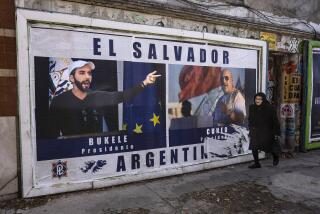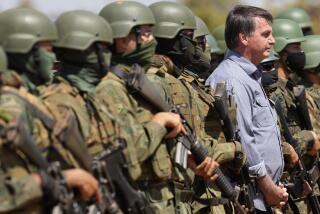In Brazil, Lula Aide Steering Toward Middle
- Share via
RIO DE JANEIRO — At each step of his eventful life in Brazilian politics, Jose Dirceu has been willing to do something daring or even a bit ruthless to advance his cause. He has served time in prison, allied himself with armed guerrillas and altered his face through plastic surgery to throw off a police dragnet.
Dirceu is the eminence grise of the new Brazil, the architect of the rise to power of President-elect Luiz Inacio Lula da Silva, known here as Lula. A Marxist revolutionary who for years lived in exile in Fidel Castro’s Cuba, Dirceu fought with and eventually tamed the radicals in Lula’s own Workers’ Party during this year’s successful campaign.
Now Dirceu, 56, is the man most responsible for shaping the face of Lula’s incoming government, according to analysts here. Again, the ex-radical is a force for moderation. He is telling the Trotskyites, Maoists and other Marxists who make up a third of party ranks that deep social reform in Brazil must wait.
“Jose Dirceu is without a doubt the most important political figure in the Workers’ Party and the organizer of the party’s move to the center,” said Walder de Goes, president of the Brazilian Institute of Political Studies.
When Lula announces his Cabinet, perhaps as early as Tuesday, Dirceu is expected to be named chief of staff.
De Goes compares Dirceu to another famous behind-the-scenes figure from Brazilian history, Gen. Golbery do Couto e Silva, who in the 1970s acted as a buffer within the military dictatorship between hard-liners and those calling for a democratic opening.
In recent weeks, leading up to the Jan. 1 inauguration, Dirceu has been shuttling back and forth between the party’s base in Sao Paulo and Brasilia, the capital, trying to smooth the road ahead for the new president.
Lula will face a difficult first year in office. Brazil’s public debt stands at $260 billion. Under the terms of a $30-billion bailout granted by the International Monetary Fund in October, the outgoing government of Fernando Henrique Cardoso agreed to slash spending. Lula has said he’ll abide by the accord.
And yet many Brazilians look to the president-elect -- a former trade unionist and the son of impoverished migrants -- to make good on his promise to end hunger and address this nation’s unrelenting poverty. Lula also has said he will take a more nationalistic approach to trade negotiations with the United States.
On Nov. 28, Dirceu told the party’s congressional caucus that the Brazilian people will have to endure at least a year of austerity before the Workers’ Party delivers on its most important promises.
“The country already knows 2003 will be a difficult year,” he said, adding that alliances with center-right parties might be necessary. “We are not going to undertake an ideological confrontation with the United States because the correlation of forces does not allow it. We have to speak less and do more.”
At the same time, Dirceu said the party will remain true to its ideological roots. “We are leftists and socialists,” he said. “The elite has failed, the ‘Washington consensus’ has failed,” he added, referring to a set of free-market policies drafted by the IMF and U.S. economists.
Dirceu has been performing a similar kind of dance between political extremes for decades now, ever since he left rural Minas Gerais state to become a student organizer in the 1960s, during the years of dictatorship.
He joined the Communist Party, then became a member of Dissidencia, which broke from the party at the height of Brazil’s student movement in 1967.
Arrested at a gathering of the National Students’ Union, Dirceu lingered in a jail cell for a year. He was set free thanks to one of the most daring episodes of Brazil’s guerrilla movement: the 1969 kidnapping of U.S. Ambassador Charles Elbrick.
Grabbed in a Rio de Janeiro ambush, Elbrick was held for four days until Dirceu and 14 other radicals were freed from prison and flown to Mexico. Dirceu was granted asylum in Cuba.
He trained as a guerrilla in Cuban military schools for foreign revolutionaries that Ernesto “Che” Guevara had helped establish. In 1971, Dirceu returned to Brazil clandestinely as part of a guerrilla group called the Movement for Popular Liberation. “I trained in guerrilla warfare, yes, but I didn’t like it,” he said in a later interview.
After another brief stay in Cuba, he returned to Brazil in 1975, this time with a new identity and a new face to go with it. He was now Carlos Henrique Gouveia, a “businessman” and resident of a small southwestern town. Brazil granted amnesty to former guerrillas in 1979, and he again became Jose Dirceu. A year later he helped found the Workers’ Party with Lula, who had led a series of metal-worker strikes in Sao Paulo.
Dirceu has always been a respected top-level member of the party, a dour apparatchik never far from the elbow of the charismatic Lula. When Lula travels to Washington on Tuesday to speak with President Bush, Dirceu will be at his side.
Most of Dirceu’s former comrades from the days of armed struggle and exile accept his evolution from revolutionary to mainstream politician.
“Those times seem very remote, those kinds of people [urban guerrillas] no longer exist,” said Fernando Gabeira, a member of Congress, who was one of Elbrick’s kidnappers. “Many of us went through the armed struggle but no longer share those ideals.”
*
Tobar reported from Buenos Aires and Gobbi from Rio de Janeiro.
More to Read
Sign up for Essential California
The most important California stories and recommendations in your inbox every morning.
You may occasionally receive promotional content from the Los Angeles Times.














